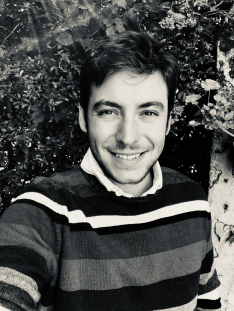
Marco Signori (Novi Ligure, 1993) studied Philosophy at the University of Pisa (BA 2015, MA 2017) and the Scuola Normale Superiore (Diploma, 2017), where he also earned his PhD in the History of Medieval Philosophy in 2022, under the supervision of Amos Bertolacci. His doctoral dissertation consisted in the first complete English translation, with introduction and an extensive commentary, of Abū Ḥāmid al-Ġazālī’s Intentions of the Philosophers [Maqāṣid al-falāsifa], an encyclopaedic summa of Peripatetic philosophy written in Arabic at the turn of the 12th century. During his PhD, he spent a period of research at the Warburg Institute in London, working with Charles Burnett and Ayman Shihadeh (at SOAS). At IMT, Marco is currently Assistant Professor (RTD-a) in the History of Medieval Philosophy. He previously held a position as a research collaborator at the same institution (in the program IMT4Career), focusing on the Arabic-Latin sources of Dante Alighieri’s natural philosophy (Nov 2021-Nov 2022), and a research grant on the manuscript tradition of the Maqāṣid in Arabic, Latin, and Hebrew (Nov 2022-May 2023). In the framework of a general interest for the long-lasting, changing history of Aristotelianism, his two main fields of research are Arabic-Islamic philosophy and the Latin reception of Arabic thought, with special reference to key figures such as Avicenna, al-Ġazālī, and Albert the Great. He is also interested in connected topics, such as the relationship between philosophy, theology, and literature in Latin-Christian and Arabic-Islamic milieus, the issues and challenges of intercultural thought, the relation between text and diagram in scientific and philosophical manuscripts, as well as the history of (modern) sciences branching off from philosophy as a unitary system. He wrote his BA thesis on Dante’s notions of happiness and the desire of knowledge in the Convivio, and continued studying Dante’s philosophical thought, with special reference to the scientific, Aristotelian underpinnings of the poetic representation of the Commedia.
